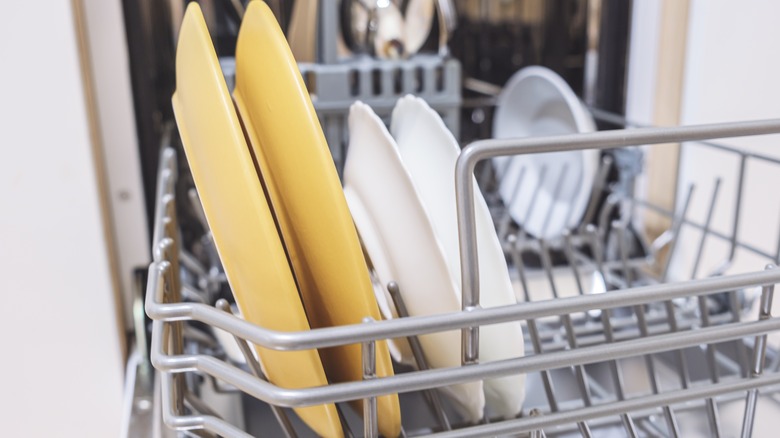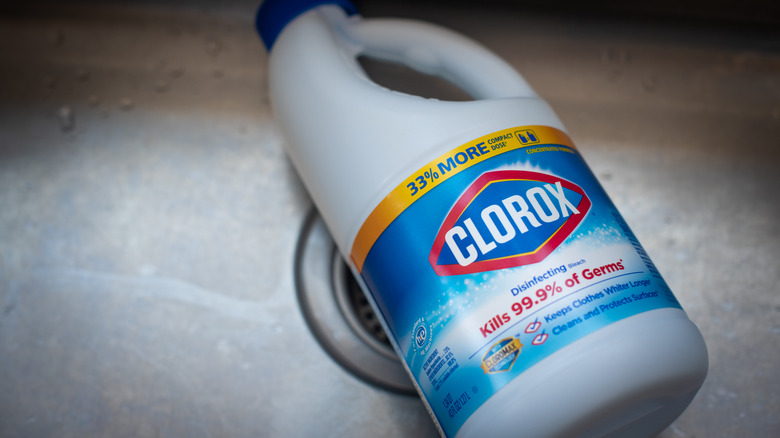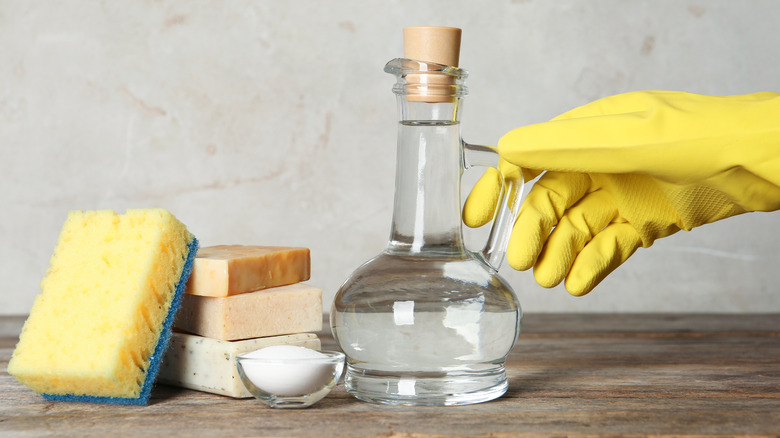This Is What Happens When You Use Bleach In Your Dishwasher
Cleaning your dishwasher may not be on the top of your to-do list. However, if you haven't cleaned it recently, you may want to do so soon. The Home Depot recommends cleaning your dishwasher once a month if you use it regularly and no less than every 6 months regardless of use. This is because food, grease, grime, and minerals can start to build up on the inside of your dishwasher. Over time, this can cause a number of issues, from your appliance running less effectively to bad odors.
Luckily, cleaning your dishwasher is pretty simple. Many homeowners use bleach, a disinfecting ingredient. However, there are a few things to consider before deciding to use bleach, as the cleaning agent could damage your dishwasher. Furthermore, bleach alone is not enough to thoroughly clean your dishwasher, as it only works as a disinfectant and won't necessarily remove stubborn build-up. Keep reading to find out if cleaning with bleach is appropriate for you, and which other products you can use as an alternative.
Some things to consider
Whether or not bleach can be used for cleaning depends on the type of dishwasher you own. If the inside of your appliance contains any amount of stainless steel, The Home Depot advises against using bleach, as it can corrode the steel. In fact, you should only use bleach in your dishwasher if you are certain it is safe to do so. The best way to make sure is to check with the dishwasher manufacturing company. According to Emborahome, bleach-safe appliances will be labeled as such.
If you can use bleach in your dishwasher, you must do so safely. The CDC provides important warnings when using bleach to clean. First, you never want to mix bleach with ammonia or another cleaning product, as this mixture creates harmful gases. Second, wear gloves whenever using bleach to protect your skin from direct contact. You'll also want to wear protective eyewear for the same reason. To avoid breathing in harmful fumes, only use bleach in well-ventilated areas, or wear a respirator. Lastly, make sure to store bleach safely at the appropriate temperature, and out of reach of children and pets.
What else can clean your dishwasher
If you can use bleach in your dishwasher, it should follow a more thorough cleaning. While bleach is an excellent disinfectant, it does not have the cleaning power to remove gunk or grime, explains EmboraHome. To remove stains, food, grease, and odors, try using gentle but effective white vinegar instead. After emptying your dishwasher, fill a dishwasher-safe bowl with just 1 cup of white vinegar and place it on the top rack, instructs Architectural Digest. Close the door and run your machine on the hottest cycle, without adding any additional detergent. After the washing cycle has finished, The Home Depot recommends skipping the drying cycle; instead, you should open the door to allow your appliance to air dry.
If your dishwasher can, in fact, be cleaned with bleach, you can follow the same steps but replace the white vinegar with 1 cup of bleach. Using both methods will thoroughly clean and sanitize your dishwasher. If you can't use bleach, you can repeat the cycle with vinegar until your dishwasher is sparkling. Or, as Architectural Digest suggests, you could try using baking soda. Simply sprinkle 1 cup of baking soda in the bottom of your dishwasher and run it on a short cycle to eliminate odors and remove stains.


